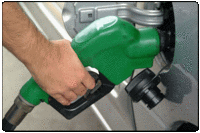Gas Saving Tips for Memorial Day Weekend Driving
BETHESDA, Md., May 22, 2007 /PRNewswire-USNewswire/ -- Motorists traveling on Memorial Day weekend can't do much about the high price of gas, but they can pay less at the pump by making sure their vehicles get maximum fuel economy. According to the Car Care Council, fuel economy is directly related to vehicle care and driver behavior and both can have a significant impact on how much motorists pay at the pump.
Under-inflated tires can impact the vehicle's fuel economy. When tires aren't inflated properly, it's similar to driving with the parking brake on and can cost a mile or two per gallon.
Dirty air filters can also waste gas and cause the engine to lose power. An air filter that is clogged with dirt, dust and bugs chokes off the air and creates a "rich" mixture, which is too much gas being burned for the amount of air. Replacing a clogged air filter can improve gas mileage by as much as 10 percent, saving about 15 cents per gallon.
Worn or dirty spark plugs can cause misfiring, which wastes fuel. Vehicles can have four, six or eight spark plugs that fire as many as three million times every 1,000 miles, resulting in a lot of heat and electrical and chemical erosion. Spark plugs that are replaced per the owner's manual will lead to a better performing vehicle.
Vehicle gas caps that are damaged, loose or missing altogether waste gas. According to the council, about 17 percent of the vehicles on the road have gas cap problems, causing 147 million gallons of gas to vaporize every year.
"When gas prices soar, many motorists hunker down and don't take proper care of their vehicles," said Rich White, executive director, Car Care Council. "What they don't realize is that they can save at the pump by simply checking the tires, air filters, spark plugs and vehicle gas caps. These items can make a significant difference in the vehicle's fuel economy and it takes very little time and money to check them."
When it comes to driver behavior, the council reminds motorists that aggressive driving can lower gas mileage by as much as 33 percent on the highway and 5 percent on city streets, resulting in seven to 49 cents per gallon.
Staying within the speed limit also improves fuel economy. Gas mileage decreases rapidly at speeds above 60 miles per hour (mph) and each mph driven over 60 will result in an additional 10 cents per gallon.
Excessive idling wastes gas and is unnecessary. A vehicle needs only one or two minutes to warm up. Motorists should also avoid jackrabbit starts and hard stopping, both that make a car less fuel-efficient. Gradually stepping on the gas and gently applying the brakes will improve fuel efficiency.
Although traveling usually involves carrying luggage, motorists should try to limit any extra weight or unneeded items in the trunk. An extra 100 pounds can cut fuel efficiency by 1 or 2 percent.



